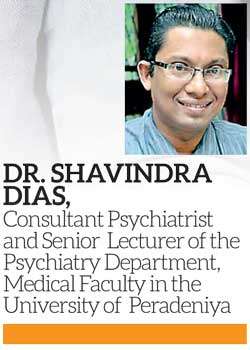13 Jul 2018 - {{hitsCtrl.values.hits}}

 Well, this is a story about totally different people. There are people in this world who are unable to interact with the society. The very first recognizable sign is avoiding eye contact. They never maintain eye contact while speaking. They talk in a robotic manner without variations in tone or sans expressions. They might obsessively talk about one or two topics of their own interest such as rocks, ocean, cars, football match statistics, financial facts and mathematics (which is the case most of the time). They don’t even care whether the listener is interested in the talk or not.
Well, this is a story about totally different people. There are people in this world who are unable to interact with the society. The very first recognizable sign is avoiding eye contact. They never maintain eye contact while speaking. They talk in a robotic manner without variations in tone or sans expressions. They might obsessively talk about one or two topics of their own interest such as rocks, ocean, cars, football match statistics, financial facts and mathematics (which is the case most of the time). They don’t even care whether the listener is interested in the talk or not.
They wouldn’t let the listener speak, and make him or her listen even if he or she is uncomfortable with the topic. They would back away from events and parties where people gather and interact with each other. They have few or no friends. But seldom are all these symptoms present in an individual. These symptoms vary widely. They take pride in their special abilities, but get annoyed if they got to know that others think they need to be cured.
People with Asperger’s are found to be beneficial for many professions where attention to detail is needed, stable and strict decisions (not swayed by other’s opinion) must be taken, the employee has to work independently, when there is a need to recognize patterns unseen by others and when there is a need for people to be very original in their thinking

Does this condition sound familiar? The above qualities are seen in a person with Asperger’s Disease. Do you know anyone with these symptoms? It may be a child, an adult or an adolescent. We decided to speak on this topic with Dr. Shavindra Dias, Consultant Psychiatrist and Senior Lecturer of the Psychiatry Department, Medical Faculty in the University of Peradeniya for the benefit of our readers.
The symptoms are recognizable in children when they reach the age of 11 or when they are in the school age. Children, young adults as well as the elderly would also have Asperger’s Syndrome with the condition not being recognized. Surprisingly, this syndrome is five times more common in boys
than in girls.
The symptoms are recognizable in children when they reach the age of 11 or when they are in the school age.
An Austrian paediatrician named Hans Asperger observed the social difficulties of four young patients in 1994, which were later published, but it gained no publicity. English Physician Lona Wing published a series of case studies of children with the same symptoms named “Asperger’s Disease” in 1981 and it was widely popular. It is now a part of a broader category called Autism Spectrum Disorder (ASD), a high functioning type of ASD.
Recognition is key
Family and friends would have seen and understood that the individual is quite ‘Different’ from others in the society. Asperger’s syndrome often remains undiagnosed until a child or adult begins to have serious difficulties in school, the workplace or in their personal lives. Adults are mostly diagnosed with Asperger’s syndrome while seeking treatments for related issues such as Anxiety and Depression. The diagnosis is primarily centred around difficulties in social interactions. To the untrained observer, a child with Asperger’s Disorder may just seem like a neurotypical child behaving differently. Individuals with Asperger’s Syndrome usually want to fit in and have interaction with others, but often they don’t know how to.
Speech-language therapy will be used to improve communication skills including maintaining eye contact and continuing with dialogues (two – way conversations) as well as understanding social cues such as hand gestures and signals
They may be socially awkward, won’t understand conventional social rules and make limited eye contact, seem unengaged in a conversation and do not understand universal nonverbal cues such as a smile, frown or the use of gestures, humour or sarcasm. Speech patterns may be unusual, lack inflection or have a rhythmic nature, or may be formal, but also being too loud or high-pitched. Those individuals would talk about themselves. Repetitive behaviour is obvious. They hate change, for instance, having the same meal for lunch every day. There’s no difficulty in language or cognitive development, but they would have a delay in motor skills – often seen in a playground. They won’t be able to take a simple catch.
Other symptoms that are not so obvious
If you notice these signs in your child, the best step is to take him to the paediatrician, who will then refer you to a mental health expert.
Then he will observe the individual in different situations – individual’s behaviour and the way he communicates.
To the untrained observer, a child with Asperger’s Disorder may just seem like a neurotypical child behaving differently.
Treatment
The procedure for treatment will include social skills training – where the therapists will teach such individuals how to interact with the society and express themselves in more appropriate ways. Speech-language therapy will be used to improve communication skills including maintaining eye contact and continuing with dialogues (two – way conversations) as well as understanding social cues such as hand gestures and signals.
Cognitive Behavioural Therapy or CBT helps to change the way of thinking, controlling emotions and repetitive behaviour.
Parents or family will also be educated and trained to help their loved ones who are patients to develop social skills at home. Through Applied Behaviour Analysis, an individual will be encouraged to practise positive social and communication skills by giving simple responsibilities, praising and appreciating him. Some medications are also given to treat related diseases as anxiety and depression.
Do not hide - they are so common
Mental health is just like physical health and we need to take care of it. People who are suffering from mental health issues feel disturbed, hurt, and ignored. Even the family is not prepared to accept the truth that their loved one is experiencing a tough time. People believe it happens to some other people and is rare, but of course, mental health issues are so common.
Millions of people suffer from mental health issues. Many of these issues can be controlled with the understanding and support from the family and friends.
Benefits
People with Asperger’s are found to be beneficial for many professions where attention to detail is needed, stable and strict decisions (not swayed by other’s opinion) must be taken, the employee has to work independently, when there is a need to recognize patterns unseen by others and when there is a need for people to be very original in their thinking.
Genius Albert Einstein, Musician Mozart, scientist Sir Isaac Newton, author Hans Christian Anderson, Steve Jobs and Bill gates are famous examples for those who suffered from Asperger’s.
Each individual took control of his or her disability and found ways to shine and express himself or herself when socialising and during other situations that led to their success in several fields.
Having Asperger’s doesn’t mean that a child is doomed to be ‘disabled.’ Often, a bit of encouragement and parents and teachers playing to their strengths can give Asperger’s children the self-esteem it takes to succeed in whatever areas that intrigue them.
After taking treatment, the individuals are able to live normal and successful lives and there is the potential to be a genius in their chosen field.
22 Dec 2024 4 hours ago
22 Dec 2024 4 hours ago
22 Dec 2024 6 hours ago
22 Dec 2024 7 hours ago
22 Dec 2024 7 hours ago